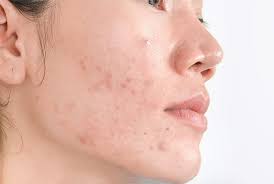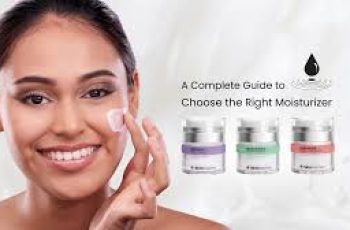Inflammation Causes Hyperpigmentation
Inflammation and Pigmentation of Skin
If your skin is reactive and sensitive with redness, flushing, or rosacea, you have inflammation which leads to many skin concerns that affect skin health such as dehydration, hyperpigmentation, and aging. For this reason, inflammation is the most important thing your skin care routine should focus on if you have dark spots on your skin.
If you have inflammation, you are at a higher risk of getting dark spots from post-inflammatory hyperpigmentation and melasma.
Your skin care routine should focus on the causes of inflammation and contain soothing an calming ingredients.
Knowing which of the 16 skin types you are will help you understand your skin’s issues and how to treat them so your skin will be healthier.
Inflammation and Hyperpigmentation
Inflammation causes hyperpigmentation of the skin. This is why dark spots often occur on the skin after acne, eczema, injury, a skin rash, or a burn.
This means that if you have sensitive skin which is characterized by inflammation, you are at a higher risk of developing uneven skin pigmentation due to hyperpigmentation.
Inflammation can be caused by many inflammatory different skin issues and is most commonly seen in sensitive skin types. Inflammation, regardless of the cause, can lead to hyperpigmentation. This occurs because, during inflammation, the immune system is activated which sends signals to the melanocytes to make the pigment melanin.
Darker Skin Types Have A Higher Risk of Hyperpigmentation
Fitzpatrick Skin Types 3 and higher have skin cells that are more easily stimulated to make melanin pigment. This means that brown and black skin tones are at a high risk of developing dark spots after pimples, a cut, or a rash.
Darker melanized skin types are particularly susceptible to getting post-inflammatory hyperpigmentation (PIH).
Dark inflamed skin may be referred to as “black rashes” because the skin where the rash is gets darker from inflammation and scratching.
Brown and black skin must be vigilant about sunscreen, sun avoidance, and their skin care routine to avoid getting these “dark rashes”.
Scratching and Pigmentation
Dark skin from scratching occurs because of inflammation. Scratching the skin causes a wound or injury to the skin. This turns on various inflammatory cascades that signal melanocytes to make melanin. The hyperpigmented skin from scratching remains even after the wound has healed and can be difficult to treat.
Using the right anti-inflammatory ingredients can help reduce itch and prevent scratching which will reduce the skin injury that causes skin to darken.
Eczema Causes Skin To Darken
Eczema, also called atopic dermatitis, is an inflammatory skin condition that is very itchy. The inflammation causes hyperpigmentation in many eczema suffers and the pigment can last long after the eczema rash goes away. Scratching eczema can cause skin to darken. Brown and black skin tends to turn very dark in areas of eczema. These dark patches should be treated with both an eczema cream and skin lightening products.
Dark Skin From a Rash
Know Your Skin Type
In order to effectively treat hyperpigmentation caused by inflammation, you must first identify what is causing your inflammation and skin sensitivity and reactivity.
Causes may include:
Acne
Allergy
Dryness
Eczema
Over-exfoliation
Psoriasis
Rosacea
Sun sensitivity
Using the wrong skin care products
Many times you do not realize you are causing your own inflammation by using the wrong skin care products! A common issue I see in my patients is over-exfoliating and using products that are wrong for their skin type.
This is one of the many reasons I developed a skin type quiz that helps you design a custom skin care routine that identifies and targets all of your skin issues. It identifies you as 1 of 16 skin types.
Once you identify your skin type, you will receive educational material, product suggestions, and be able to read reviews from others with the same skin type as you.
You can even come to Reddit r/skintypesolutions and ask others with the same skin type which products they like and dislike.
Products To Treat Inflammation and Pigmentation
If you have acne or rosacea and dark spots- products with ingredients that block inflammatory pathways and melanin production are key.
These are the prodcuts I recommend ot my patients who have sensitvie skin and hyperpigmentation:
Derma Made Azelaic Acid Cream 15% has azelaic acid in it which is almost as strong as 20% prescription strength. It was made by a dermatologist to treat dark spots from acne and to use as part of a skin care rotuine for rosacea and melasma.
Azelaic acid has these benefits:
Soothing and calming
Blocks melanin Production
Exfoliant
Vichy LiftActiv B3 Serum Dark Spots & Wrinkles Anti-Aging Serum has both niacinamide and tranexamic acid that target both inflammation and pigmentation. Vitamin C is an antioxidant and tyrosinase inhibitor, while allantoin is soothing.
SkinCeuticals Discoloration Defense has niacinamide and traxeamic acid that soothe skin and prevent dark spots. It also contains kojic acid which is an exfoliant and a tyrosianse inhibitor that blocks melanin prodcution.
Alastin A-Luminate Brightening Serum is one of our favorite dermatologist-recommended skin lighteners for sensitive skin. It uses high tech ingredients which are discussed in the interview with the creator of Alastin Skincare Dr. Widgerow below.
This product features these ingredients:
Niacinamide
Tranexamic Acid
Gallic Acid
Hesperidin
Thermus Thermophillus Ferment
Silybum Marianum (Milk Thistle) Extract
Withania Somnifera (Ashwagandha) Root Extract
Vitamin C
In addition to its well known TriHex technology.
Skin Care Routines
When a dermatologist prescribes a skincare routine to help prevent dark skin after rashes, pimples, burns and injury, they will focus on 3 types of skin care products:
Sunscreen
Products that block melanin production or transfer like tyrosinase inhibitors and PAR-2 blockers
Soothing ingredients
In a skin care routine to prevent skin from getting darker after inflammation, you need anti-inflammatory ingredients and skin-lightening ingredients. Our dermatologists have designed regimens that block inflammation from occurring and discourage melanocytes from making melanin. We use ingredients that will calm the skin while inactivating melanocytes to block pigment production.
Conclusion
Reducing skin inflammation is the most important step in a skin care routine. If it’s not under control, the other barriers to skin health are hard to control because inflammation causes hyperpigmentation, skin aging, and can injure the skin barrier.
So make sure your entire skin care routine is correct for your Baumann Skin Type. Take our skin care routine quiz and we can help you customize a routine that targets inflammation and hyperpigmentation and any other skin issues you have.
DQH Knowledge drop: In your 20s, your skin cell turnover decreases. (Cell turnover is a key component in keeping your skin youthful.) You know what else slows down? Your collagen production. Starting in your 20s, collagen decreases by about 1 percent per year. Should you want to prevent fine lines and wrinkles, start by eliminating behaviors that contribute to premature aging. “If it’s bad for you, it’s bad for your skin,” says dermatologist Michel Somenek.
“Cigarette smoking reduces blood flow to the skin and causes premature wrinkling and a dull skin texture. Making the repeated pursed motion to inhale can also cause smoker’s lines. Alcohol and recreational drugs are toxins for the skin that damage its cellular structure and DNA,” Somenek tells us. “The faster you eliminate vices while you are young, the better chance your skin and body have to recuperate.” Also, adopting an anti-aging routine in your 20s is key. After all, the best offense is a good defense. We spoke to Somenek and experts Joshua Ross and Audrey Kunin to find out more.
Keep reading for the best anti-aging products for your 20s, according to skincare professionals.
Sunscreen
“We all know that the sun is the number one cause of skin aging and starting the prevention in your 20s is very important,” Ross says. “The majority of your sun damage won’t start to appear until you’re in your 30s, so don’t wait until you see it surface or you’ll be behind the curve. Stay ahead of it with a good-quality zinc-based sunscreen worn daily.”
Farmacy Green Defense Daily Mineral Sunscreen
An invisible sunscreen with SPF 30, plus botanical extracts meant to protect skin with tons of antioxidants. Bonus: It’s clean and fine to use under makeup.
Bareminerals Complexion Rescue™ Tinted Moisturizer Broad Spectrum SPF 30
Although we recommend you use your SPF and moisturizer separately, we also understand moments when you don’t have time or energy for that extra step. For those times, this bareMinerals moisturizer is a great thing to have on hand.
Vitamin C Serum
“A great introduction to anti-aging is to start with a vitamin C serum in your morning skincare routine,” Ross says. “It’s a powerful antioxidant that will neutralize free radicals and brighten the skin.” He adds that it’s a great way to counteract the effects of the sun’s harmful rays, which, as previously mentioned, are among the biggest causes of premature aging.
Drunk Elephant C-Firma™ Vitamin C Day Serum
The Drunk Elephant C-Firma is a lightweight serum that promises to give skin a glow by combining the brightening powers of vitamin C with ferulic acid, l-ascorbic acid, and vitamin E. The included sodium hyaluronate is meant to replace hydration loss, so you shouldn’t have to deal with any irritation.
Sunday Riley C.E.O. Rapid Flash Brightening Serum
This potent serum is jam-packed with vitamin C (15 percent, to be exact), which means it’s a potential superstar at both brightening skin and dousing it in antioxidants.
Peptides
Using peptides on your skin has many benefits, says Somenek. “The skin barrier is what defends the body against pollution, UV rays, bacteria, and toxins. It can be damaged by several everyday factors. Using topical peptides aids in building a stronger barrier,” he says. “Peptides comprise elastic fibers, which are a type of protein. These fibers help to make skin appear taut and firm. Peptides can also help repair damaged skin, relieve inflammation, and even out skin tone. Some peptides can kill acne-causing bacteria that is common in 20-somethings.”
Kunin agrees, saying, “Peptides are an excellent entry point for supporting collagen.” She recommends looking for face and eye treatments that contain these collagen-boosting powerhouses.
Charlotte Tilbury Magic Eye Rescue Cream
This Charlotte Tilbury super-emollient eye cream has a base of coconut oil and shea butter (read: it’s incredibly hydrating). Botanicals plus peptides are meant to help reduce dark circles and boost collagen, respectively.
This creamy moisturizer serves up potent collagen-boosting peptides and pycnogenol, and antioxidant-rich vitamin C. “Instead of sitting on top of the skin, peptides penetrate the outer layer so they go deep. The ‘signals’ they send tell the cells to produce elastin and collagen, which are needed for youthful-looking skin,” explains Somenek.
At-Home Peel Pads
Remember that skin cell turnover fiasco we talked about earlier? One way to help support it is by exfoliating. “Exfoliation is important to help keep skin fresh and luminous,” Kunin says. She recommends using at-home peel pads as an easy and effective way to exfoliate.
“The goal in your 20s is to fight the slowing pace of cell turnover. It is wise to use products that gently exfoliate, yet still remove oil and other impurities. Products that have Alpha Hydroxy Acids (AHA) or Beta Hydroxy Acids (BHA) are a good choice.”
According to Somenek, you should only exfoliate two to three times a week. “People of all ages are guilty of over-exfoliating and that can be too much of a good thing,” he says.
Dermadoctor Kakadu C Intensive Vitamin C Peel Pad
A few swipes of this Derma Doctor powerful peel pad promise to leave your skin glowing and smooth, thanks to the seven (yes, seven) types of chemical exfoliants, including AHA and BHA. It also contains vitamin C via Kakadu plum extract for added brightening and antioxidant protection.
KEY INGREDIENTS Kakadu plum extract is sourced from the Kakadu plum, a fruit grown in northern Australia. It contains vitamin C, which restores the skin’s natural barrier, increases collagen production, and soothes irritation.
Dr. Dennis Gross Skincare Alpha Beta® Universal Daily Peel Pads
These are the gold standard of peel pads, with a cult following and over 900 five-star reviews on Sephora. They’re easy to use and contain a blend of anti-aging exfoliating acids.
Emollient Night Cream
“In your 20s, you need to start upping the hydration in your skincare routine. You may have been cautious of over-moisturizing because of acne in your teens, but as you enter your 20s, your skin transitions and becomes drier,” Ross says. “I recommend an emollient night cream added into your evening skincare regimen.”
“Twenty-somethings need to make sure that they are not using creams that will clog their pores and cause excess oil production,” says Somenek. Opt for non-comedogenic products.
Cerave Skin Renewing Night Cream
One great choice is the CeraVe Skin Renewing Night Cream, which is a non-comedogenic night cream that leaves skin soft and glowy. It combines the moisturizing powers of ceramides and hyaluronic acid.
RoC Retinol Correxion Max Hydration Creme
“The best night cream ingredients contain retinol, benzoyl peroxide, and/or salicylic acid or hyaluronic acid. The goal is to moisturize, yet remove excess oil,” says Somenek. This Roc Retinol Correxion cream fits the bill as it contains both hyaluronic acid and retinol so it promises to moisturize while also being non-comedogenic.



